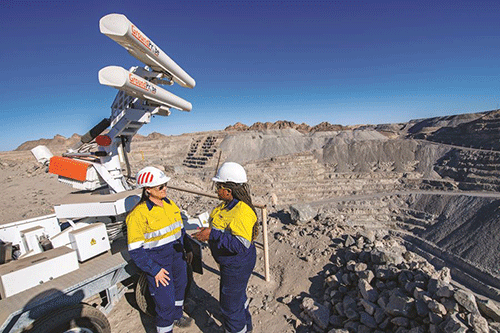Beifang Mining, the new mining contractor for the Rössing Uranium Mine, has promised to employ 95% Namibian workers when it takes over the operations of the mine in 2026.
This is when Rössing Uranium’s current mining operations come to an end and when the Chinese mining contractor will assume charge for 13 years in extracting uranium from the longest-running open pit uranium mine in the world.
This transition was agreed to in May this year, with Beifang expected to have full control of mining operations by 2027.
“The Rössing board approved the life of mine extension project in February
2023. As part of this, Beifang has been selected to mine phase 4 of the SJ open pit on a contract basis of 13 years, after a lengthy and successful tender process to find a suitable mining contractor,” said Rössing’s managing director Johan Coetzee.
Rössing Uranium’s current operations consist of two distinct activities, namely mining uranium-bearing rock and processing this ore into uranium oxide for the world’s nuclear energy market, which fuels the generation of electricity.
The uranium, located in Rössing’s mining licence area, is embedded in very hard and abrasive granitic rock, known as alaskite.
To mine the necessary volume of ore and waste, the mine conducts regular blasting operations.
Electric and diesel-powered shovels load uranium-bearing rock onto haul trucks, which transport the ore to the primary crushers for the first stage in the crushing process. From there, the crushed ore is conveyed to a coarse ore stockpile, where it is reclaimed and put through additional crushing stages in a fine crushing plant before the processing stage of operations begins. In 2022, Rössing Uranium mined 16.6 million tonnes of material, which is 20% less than in 2021. Of the material mined, 9 million tonnes was ore (10% less than in 2021), with waste and low-grade material making up 7.4 million tonnes, equating to a strip ratio of 0.81. A further 0.2 million tonnes of waste was dumped in-pit.
Meanwhile, Rössing’s Mining Operations department remained with the previous year’s staff complement, as lower-mined tonnes are expected for the remaining life of the mine. Only 42 operators and technical employees have been incorporated into other departments, where their skills are needed.
Moreover, the mine reports success from its radar monitoring system, with four potentially catastrophic falls of the ground properly managed without risking people or equipment.
According to mine management, the geotechnical team was head-on with guidance and was able to forewarn operations teams about the impending rockfalls.
Also notable was the introduction of electronic blasting technology for pit-limit blasting.
This change allows the mine to decrease the amount of energy going into the final pit walls, which helps maintain the long-term stability of the open pit.
The technology has since been adopted for all limit blasting at Rössing Uranium Limited.



